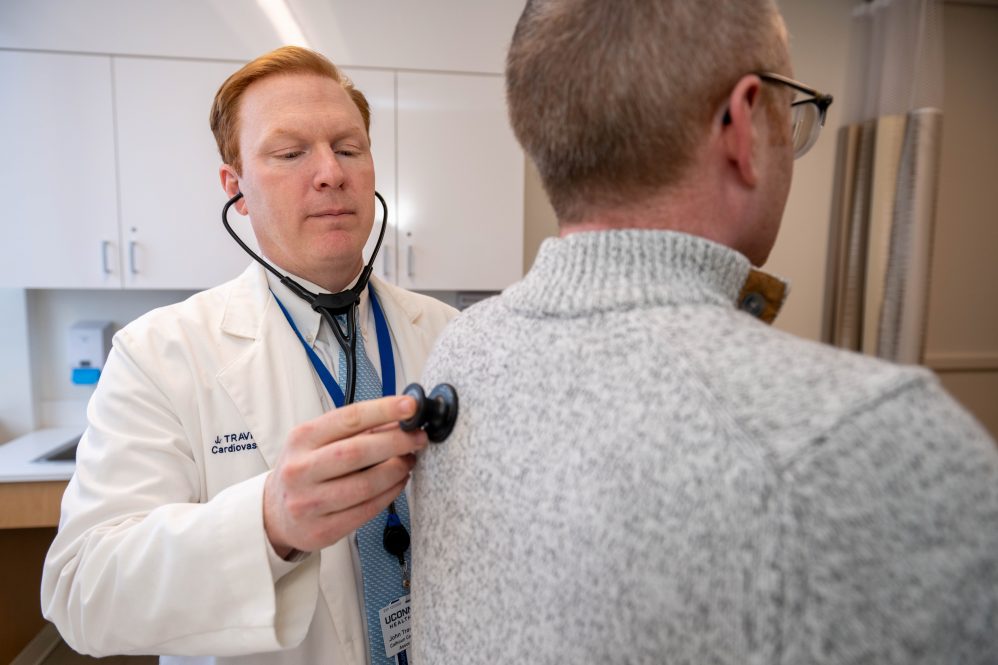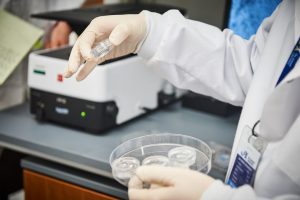NIH accelerating UConn Health cardiologist Dr. Travis Hinson's treatment for heart failure genetic mutation from lab toward in-human trials

"When we see a patient in the clinic at UConn, we do genetic sequencing to identify what type of heart failure they have," says Dr. Travis Hinson, associate professor of cardiology and genetics at UConn Health's Calhoun Cardiology Center. (Credit: The Jackson Laboratory/Cloe Poisson)
Dr. Travis Hinson, a cardiovascular physician-scientist jointly appointed at UConn Health and The Jackson Laboratory (JAX), has been awarded $611,014 from the National Institutes of Health (NIH) to support his development of a therapy for a major cause of heart failure.
As UConn School of Medicine's Pat and Jim Calhoun Endowed Professor, Hinson leads the Cardiovascular Genetics Program at UConn Health's Calhoun Cardiology Center. His research focuses on understanding the causes and potential treatments for heart failure, a condition in which the heart is not pumping blood efficiently enough to provide oxygen to the body.
One cause of heart failure is a disease known as dilated cardiomyopathy (DCM). In DCM, the muscles of the heart become enlarged and weakened, reducing their ability to pump blood effectively. The condition is quite serious; without intervention, half of patients diagnosed with DCM may die within five years.
DCM affects roughly one in 200 people, according to Hinson. Of these cases, between two and five percent can be attributed to a single genetic mutation, in a gene known as TNNT2.
"TNNT2 encodes a protein called troponin that affects how the cardiomyocyte [heart muscle cell] contracts in response to calcium," Hinson explains.
In a normal heartbeat, calcium enters the cells of the heart muscles, signaling the muscles to contract. But when there is a misspelling in the TNNT2 mutation, heart cells do not respond in the same way, leading to DCM and eventually heart failure. As many as 100,000 Americans may have this mutation, according to Hinson.
Right now, we're in what I call the 'Dark Ages' of heart failure treatment.
"This is a big problem, and there aren't any treatments that really focus on the central mechanism," says Hinson. "All the drugs we have, they tend to have a lot of side effects, so they don't work for everyone - and they don't target the primary problem. Right now, we're kind of in what I call the 'Dark Ages' of heart failure treatment, where we don't really match up your treatment with your particular type of heart failure."
Fortunately, Hinson's lab is dedicated to finding solutions for this and other causes of DCM. His work is at the cutting edge of personalized, precision medicine - understanding the root causes of an individual patient's heart condition and developing tailored treatments just for them.
This work involves some innovative methods, like growing miniature, beating heart models using a patient's own stem cells. Using these models, researchers can gain a better understanding of the patient's disease, as well as test the effectiveness of various therapies before administering them to the patient.
Reaching the Heart of the Problem
In the case of the TNNT2 mutation, Hinson's in-development therapy uses an engineered type of virus known as an adeno-associated virus (AAV). It does what viruses do best: seek and enter host cells. But unlike a harmful virus, these AAVs are carrying helpful cargo. Once they enter heart cells, they deliver a drug that changes the way calcium stimulates the muscle contraction - getting things "back to normal," says Hinson.

The results could be revolutionary.
"It's a one-and-done, single-injection virus that delivers the drug into your heart, and then it targets the troponin piece," Hinson says. "Basically, it changes out the abnormal, misspelled version for a normal version. This could be a good treatment for anyone who has a troponin T mutation."
Funding for this project comes from the NIH Catalyze program, which helps move discoveries from the lab toward in-human trials.
"It's a bridge from discovery in the lab towards a therapy in patients," Hinson says. "The NIH will help us navigate development of this therapy so that we can accelerate to humans as quickly as possible. To go from proof of concept to treating patients within five years - that's the goal."
A Unique Synergy
Hinson's innovative research group combines UConn Health's strengths in research and patient care with JAX's genomic medicine capabilities. He doesn't see these as separate spheres: treating patients helps usher in breakthroughs in the lab, and vice versa.
"I directly witness the impact on patients who have these disorders we want to fix," Hinson says. "This dual faculty role is a really supportive place for people like me. We need more positions like mine to help recruit people who do other pieces of the pie of genomic medicine … because it's such a big and important problem."
Beyond just TNNT2, Hinson is also working on projects that target other mutations that lead to DCM or heart failure. He encourages potential academic and industry partners, or private funders who have been impacted by heart disease, to reach out if they are interested in supporting UConn Health's groundbreaking research in this area.
"We have people in Connecticut who have these diseases — we need to be a leader in this area," Hinson says. "It brings in jobs, it brings in innovation, and it helps patients."
Hinson gratefully acknowledges UConn Health Ph.D. student Yu-Chieh Chen; postdoctoral associate Lisa Wren; and UConn genetic counselor Jennifer Stroop, all of whom have contributed vitally to the success of this TNNT2 treatment project.
Research reported in this publication was supported by the National Heart, Lung, And Blood Institute of the National Institutes of Health under Award Number R61HL181756. The content is solely the responsibility of the authors and does not necessarily represent the official views of the National Institutes of Health.






